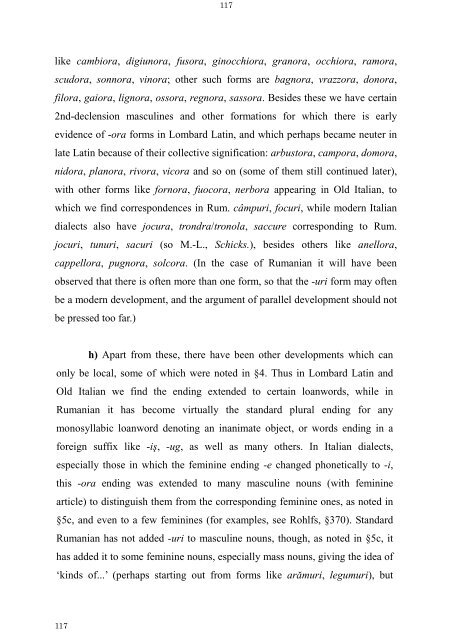The Latin Neuter Plurals in Romance - Page ON
The Latin Neuter Plurals in Romance - Page ON
The Latin Neuter Plurals in Romance - Page ON
You also want an ePaper? Increase the reach of your titles
YUMPU automatically turns print PDFs into web optimized ePapers that Google loves.
117<br />
117<br />
like cambiora, digiunora, fusora, g<strong>in</strong>occhiora, granora, occhiora, ramora,<br />
scudora, sonnora, v<strong>in</strong>ora; other such forms are bagnora, vrazzora, donora,<br />
filora, gaiora, lignora, ossora, regnora, sassora. Besides these we have certa<strong>in</strong><br />
2nd-declension mascul<strong>in</strong>es and other formations for which there is early<br />
evidence of -ora forms <strong>in</strong> Lombard <strong>Lat<strong>in</strong></strong>, and which perhaps became neuter <strong>in</strong><br />
late <strong>Lat<strong>in</strong></strong> because of their collective signification: arbustora, campora, domora,<br />
nidora, planora, rivora, vicora and so on (some of them still cont<strong>in</strong>ued later),<br />
with other forms like fornora, fuocora, nerbora appear<strong>in</strong>g <strong>in</strong> Old Italian, to<br />
which we f<strong>in</strong>d correspondences <strong>in</strong> Rum. câmpuri, focuri, while modern Italian<br />
dialects also have jocura, trondra/tronola, saccure correspond<strong>in</strong>g to Rum.<br />
jocuri, tunuri, sacuri (so M.-L., Schicks.), besides others like anellora,<br />
cappellora, pugnora, solcora. (In the case of Rumanian it will have been<br />
observed that there is often more than one form, so that the -uri form may often<br />
be a modern development, and the argument of parallel development should not<br />
be pressed too far.)<br />
h) Apart from these, there have been other developments which can<br />
only be local, some of which were noted <strong>in</strong> §4. Thus <strong>in</strong> Lombard <strong>Lat<strong>in</strong></strong> and<br />
Old Italian we f<strong>in</strong>d the end<strong>in</strong>g extended to certa<strong>in</strong> loanwords, while <strong>in</strong><br />
Rumanian it has become virtually the standard plural end<strong>in</strong>g for any<br />
monosyllabic loanword denot<strong>in</strong>g an <strong>in</strong>animate object, or words end<strong>in</strong>g <strong>in</strong> a<br />
foreign suffix like -iş, -ug, as well as many others. In Italian dialects,<br />
especially those <strong>in</strong> which the fem<strong>in</strong><strong>in</strong>e end<strong>in</strong>g -e changed phonetically to -i,<br />
this -ora end<strong>in</strong>g was extended to many mascul<strong>in</strong>e nouns (with fem<strong>in</strong><strong>in</strong>e<br />
article) to dist<strong>in</strong>guish them from the correspond<strong>in</strong>g fem<strong>in</strong><strong>in</strong>e ones, as noted <strong>in</strong><br />
§5c, and even to a few fem<strong>in</strong><strong>in</strong>es (for examples, see Rohlfs, §370). Standard<br />
Rumanian has not added -uri to mascul<strong>in</strong>e nouns, though, as noted <strong>in</strong> §5c, it<br />
has added it to some fem<strong>in</strong><strong>in</strong>e nouns, especially mass nouns, giv<strong>in</strong>g the idea of<br />
‘k<strong>in</strong>ds of...’ (perhaps start<strong>in</strong>g out from forms like arămuri, legumuri), but









